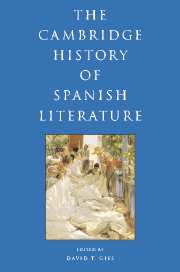Book contents
- Frontmatter
- I INTRODUCTION
- II HISTORY AND CANONICITY
- III THE MEDIEVAL PERIOD
- IV EARLY MODERN SPAIN: RENAISSANCE AND BAROQUE
- 7 Renaissance and Baroque: continuity and transformation in early modern Spain
- 8 Religious literature in early modern Spain
- 9 Renaissance poetry
- 10 The antecedents of the novel in sixteenth-century Spain
- 11 Miguel de Cervantes
- 12 The making of Baroque poetry
- 13 The development of national theatre
- 14 Lope Félix de Vega Carpio
- 15 Pedro Calderón de la Barca
- 16 Didactic prose, history, politics, life writing, convent writing, Crónicas de Indias
- V THE ENLIGHTENMENT AND NEOCLASSICISM
- VI THE FORGING OF A NATION: THE NINETEENTH CENTURY
- VII THE MODERN, MODERNISMO, AND THE TURN OF THE CENTURY
- VIII TWENTIETH-CENTURY SPAIN AND THE CIVIL WAR
- IX IN AND OUT OF FRANCO SPAIN
- X POST-FRANCO SPANISH LITERATURE AND FILM
- Bibliography
- Index
- References
15 - Pedro Calderón de la Barca
from IV - EARLY MODERN SPAIN: RENAISSANCE AND BAROQUE
Published online by Cambridge University Press: 28 March 2008
- Frontmatter
- I INTRODUCTION
- II HISTORY AND CANONICITY
- III THE MEDIEVAL PERIOD
- IV EARLY MODERN SPAIN: RENAISSANCE AND BAROQUE
- 7 Renaissance and Baroque: continuity and transformation in early modern Spain
- 8 Religious literature in early modern Spain
- 9 Renaissance poetry
- 10 The antecedents of the novel in sixteenth-century Spain
- 11 Miguel de Cervantes
- 12 The making of Baroque poetry
- 13 The development of national theatre
- 14 Lope Félix de Vega Carpio
- 15 Pedro Calderón de la Barca
- 16 Didactic prose, history, politics, life writing, convent writing, Crónicas de Indias
- V THE ENLIGHTENMENT AND NEOCLASSICISM
- VI THE FORGING OF A NATION: THE NINETEENTH CENTURY
- VII THE MODERN, MODERNISMO, AND THE TURN OF THE CENTURY
- VIII TWENTIETH-CENTURY SPAIN AND THE CIVIL WAR
- IX IN AND OUT OF FRANCO SPAIN
- X POST-FRANCO SPANISH LITERATURE AND FILM
- Bibliography
- Index
- References
Summary
Calderón: witness and mirror to a contradictory century
The year 2000 marked the fourth centenary of Pedro Calderón de la Barca’s birth. In addition to the official celebrations – exhibitions, books, conferences – there were brilliant performances of his plays, especially Calixto Bieito’s surprising and groundbreaking version of La vida es sueño (“Life is a Dream”). Some thought that, at last, Calderón was descending from the erudite library bookshelves onto the boards of present-day stages. However, on 3 December, a harsh article in the Catalan edition of El País read:
Si consideramos que un clásico es un autor importante, influyente, imprescindible para entender la historia de la literatura… no hay duda de que Calderón es un clásico. Pero si un clásico es aquel que es perpetuamente contemporáneo, aquel que siempre puede ser leído al margen de su contexto histórico, aquel que nos interpreta, que nos habla de nosotros porque habla de cosas que nunca caducan, entonces es perfectamente posible que Calderón no sea un clásico.
(If we consider that a classic is an important and influential author, indispensable to the understanding of the history of literature… there is no doubt that Calderón is a classic. But if a classic is an author who is perpetually contemporary, who can always be read outside of his/her historical context, who interprets us, who speaks to us about ourselves because he/she speaks of things that are permanent, then it is perfectly possible that Calderón may not be a classic.)
- Type
- Chapter
- Information
- The Cambridge History of Spanish Literature , pp. 265 - 282Publisher: Cambridge University PressPrint publication year: 2005



